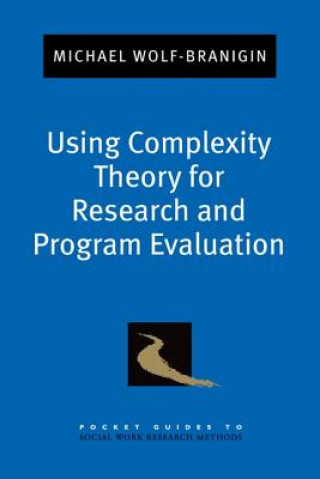
Code: 01243472
Using Complexity Theory for Research and Program Evaluation
by Michael Wolf-Branigin
Complexity as a paradigm has been underutilized by social work, but this cutting-edge pocket guide makes a convincing argument for its use. Every agency worker has been faced with a deluge of records, making it difficult to grasp ... more
- Language:
 English
English - Binding: Paperback
- Number of pages: 212
Publisher: Oxford University Press Inc, 2013
- More about this

You might also like
-

New English File Advanced Student's Book
61.04 € -

Painting in Canada
59.60 € -

Wisdom Goddess
78.96 € -

Shooting to Kill
166.44 € -

Formative Fictions
41.06 € -

Trend Towards the European Deregulation of Professions and its Impact on Portugal Under Crisis
70.87 € -

Counseling LGBTQ Americans
32.66 €
Give this book as a present today
- Order book and choose Gift Order.
- We will send you book gift voucher at once. You can give it out to anyone.
- Book will be send to donee, nothing more to care about.
More about Using Complexity Theory for Research and Program Evaluation
You get 161 loyalty points
 Book synopsis
Book synopsis
Complexity as a paradigm has been underutilized by social work, but this cutting-edge pocket guide makes a convincing argument for its use. Every agency worker has been faced with a deluge of records, making it difficult to grasp onto structures and trends undergirding behavior. Complexity theory studies the interactions of competitive and cooperative tendencies of agents such as individuals, families, groups, or communities, making the case that there is a hidden order in things that are seemingly chaotic. Exploring their interactions involves identifying a set of simple rules that the agents follow, revealing patterns that emerge without a predetermined template. Readers will learn how to frame their research using the components found in complex systems by using their existing knowledge of research methods and applying basic mathematical concepts. Concepts such as bordering between chaos and equilibrium, diverse perspectives, diverse heuristics, robustness, and wisdom of crowds are considered and applied to social work research studies. Basic introductions on game theory, graph theory, Boolean logic, decision theory, and network science provide the necessary mathematical background for understanding interconnectedness and networking. The next part of the book is a hands-on guide to the agent-based modeling software NetLogo. By inputting initial parameters and rules, the outputted models provide valuable information for visualizing unintended consequences, including how conflict can foster cooperation and how threats to a social network can improve the network's robustness and resiliency. The result is both a user-friendly introduction to using complexity theory in a socio-environmental context and a framework that provides an overarching structure for investigating process, outcomes, and the collective behavior of groups.
 Book details
Book details
Book category Books in English Society & social sciences Sociology & anthropology Sociology
65.24 €
- Full title: Using Complexity Theory for Research and Program Evaluation
- Author: Michael Wolf-Branigin
- Language:
 English
English - Binding: Paperback
- Number of pages: 212
- EAN: 9780199829460
- ISBN: 0199829462
- ID: 01243472
- Publisher: Oxford University Press Inc
- Weight: 288 g
- Dimensions: 211 × 141 × 11 mm
- Date of publishing: 07. March 2013
Trending among others
-

Birth Of A Mother
22.42 € -

Fair Play Deck
20.48 € -9 % -

Tragedy and Hope
44.55 € -

Sex at Dawn
13.72 € -21 % -
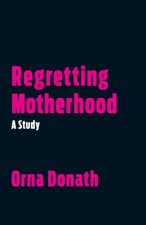
Regretting Motherhood
15.76 € -9 % -

Theory of the Leisure Class
12.28 € -23 % -
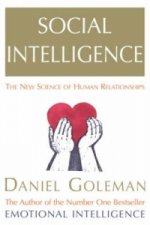
Social Intelligence
12.90 € -24 % -

Eroticism
12.28 € -23 % -

Surrendered Wife
11.15 € -23 % -

NINETY PERCENT OF EVERYTHING
18.63 € -6 % -

Gifts of Imperfection: 10th Anniversary Edition
28.77 € -

Bushido the Soul of Japan
11.46 € -

Tragedy and Hope
71.08 € -

World-Systems Analysis
22.01 € -12 % -

Cruel Optimism
27.75 € -6 % -

Critique of Everyday Life
37.38 € -19 % -

Studies on the Abuse & Decline of Reason
18.53 € -

Post-Adoption Blues
18.73 € -

Blueprint for Revolution
12.28 € -23 % -

Wanderlust
16.99 € -20 % -

Dying for Ideas
13.51 € -10 % -
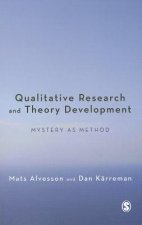
Qualitative Research and Theory Development
45.88 € -9 % -

Social Change in a Peripheral Society
33.59 € -

Treatise on the Family
73.23 € -

From Benito Mussolini to Hugo Chavez
46.90 € -

Return to Meaning
56.33 € -

Being Mortal
19.76 € -9 % -

Marriageology
25.80 € -5 % -

Intimate Communion
13.82 € -20 % -
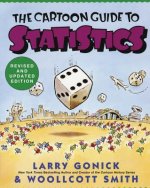
Cartoon Guide to Statistics
19.55 € -16 % -

Small Is Beautiful
11.15 € -23 % -

Book of Tea
10.13 € -22 % -

More Than Two
30.72 € -2 % -

World of Sex
6.85 € -23 % -

Being Mortal
13.82 € -1 % -

True Believer
14.23 € -23 % -

Marriage, a History
18.53 € -13 % -

Why Love Hurts - A Sociological Explanation
18.63 € -

Past Mortems
10.13 € -22 % -

Population Control
14.43 € -23 % -
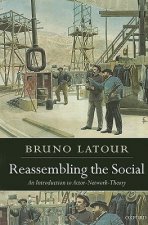
Reassembling the Social
53.36 € -

Class Ceiling
13.10 € -10 % -

Chrysanthemum and the Sword
18.94 € -

Family and Civilization
22.93 € -6 % -

Braving the Wilderness
8.70 € -21 % -

Intercourse
15.46 € -23 % -
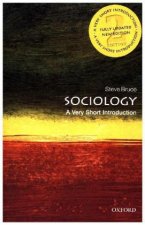
Sociology: A Very Short Introduction
10.13 € -22 % -

Death and the Afterlife
18.84 € -22 % -

Social Construction of Reality
12.28 € -23 %
Collection points Bratislava a 2642 dalších
Copyright ©2008-24 najlacnejsie-knihy.sk All rights reservedPrivacyCookies



 15549 collection points
15549 collection points Delivery 2.99 €
Delivery 2.99 € 02/210 210 99 (8-15.30h)
02/210 210 99 (8-15.30h)